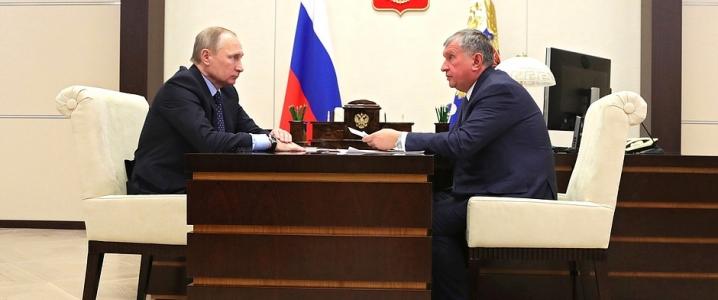Authored by Irina Slav via Oilprice.com,
Rosneft’s chief executive Igor Sechin wants Russia to quit its production control deal with OPEC, Reuters reported last week, citing sources that have seen a letter Sechin wrote to President Putin. According to the sources, Sechin sees the OPEC deal as a threat to Russia that benefits the United States, but the likelihood of his opinion leading to a pullout from the deal is limited.
Sechin is one of the closest allies of Putin and one of the most powerful figures in Russian politics. As Forbes’ Kenneth Rapoza wrote last year, many politicians and big business executives seem willing to face Putin on a bad day. Less so are those willing to face Rosneft’s chief. What’s more, Sechin is not the only one unhappy with the OPEC deal.
“The letter is a threat to the deal extension. But anyway, Putin is the ultimate decision maker,” one of the Reuters sources said. The perspectives of Russia’s President and the biggest players in its oil industry may differ here. For Putin, the OPEC deal is really a geopolitical tool rather than a tool for raising oil prices. Russia does not need prices higher. In fact, if they go too high, they will hurt the Russian economy. For the oil industry, however, it’s about the oil and the markets more than it is about geopolitics.
Russia first joined forces with OPEC to exert more control over international oil prices in late 2016, when the first OPEC+ production cut agreement was sealed. It aimed to remove some 1.8 million bpd from the oversupplied global market that had pressured prices to below US$30 per barrel for Brent crude. The cuts worked so well that prices rebounded significantly, prompting last year a reversal, as large oil importers found it harder to keep buying at previous rates.
Another rebound followed, reinforced by the reimposition of U.S. sanctions against Iran, which would substantially reduce the availability of Iranian crude on international markets. The effect of the sanctions, however, did not unfold quickly and the granting of sanction waivers to the largest Iranian oil importers led to another slump in oil prices. That’s when OPEC started talking about a new round of cuts.
To be fair, Russia was reluctant about joining this round from the start. Moscow budgets lower than current prices, so higher prices were not a necessity for Russia. But the geopolitical agenda is still there, so it was hardly a surprise that despite the conspicuous reluctance, Russia eventually signed up for the new cuts, but at a lower rate than last time. Yet despite this, Russia has also made clear it would rather pass on the opportunity for a closer relationship with OPEC.
Earlier this month, The Wall Street Journal reported that OPEC was seeking to formalize its ties with Russia for the long term. However, Back in December, Energy Minister Alexander Novak said, “There is a consensus that there will be no such organization. That’s because it requires additional bureaucratic brouhaha.” The brouhaha is probably the least of Moscow’s reservations about such an arrangement that would be as binding for it as for the other parties—something Sechin and his peers will have trouble stomaching and something that is clearly not to Putin’s taste. If it was, it would have happened.
The OPEC+ group is meeting in April to review the cuts agreement. Igor Sechin may want to pull Russia out of it, which would probably lead to a sudden and sharp price drop, but his chances of success are doubtful. Vladimir Putin has indicated on numerous occasions and in numerous ways that he is playing the long geopolitical game, of which the cuts agreement is only a small part.
via ZeroHedge News http://bit.ly/2X0vPvx Tyler Durden
